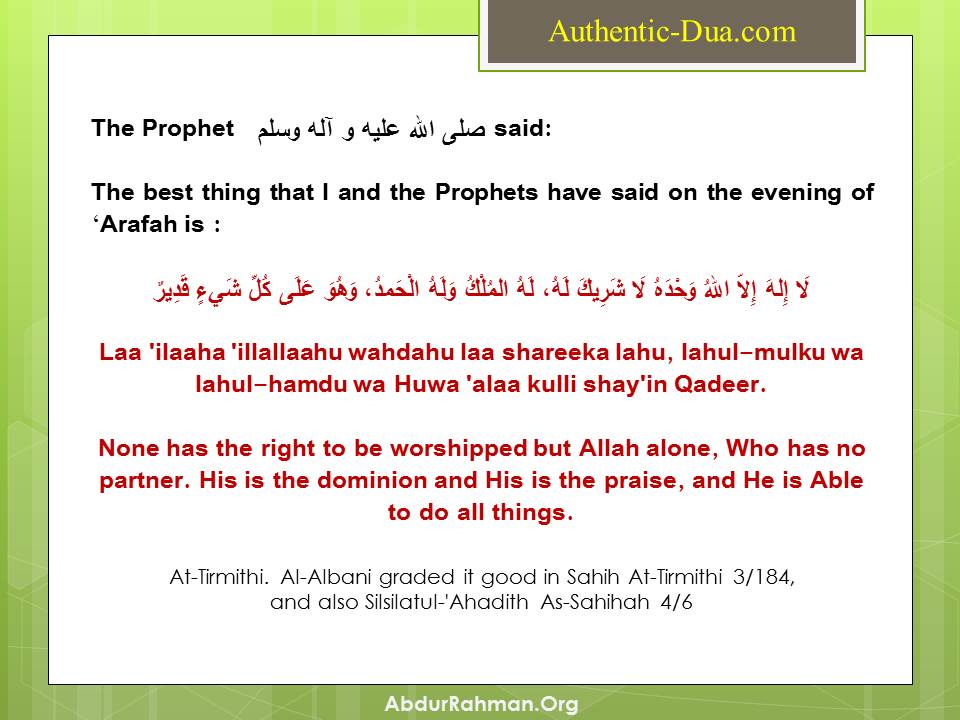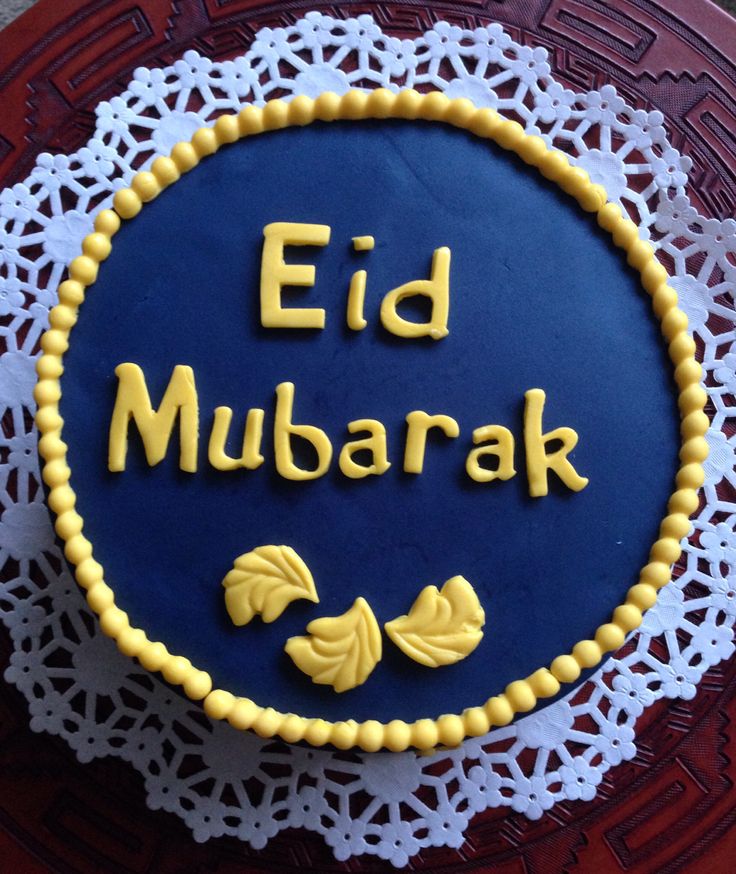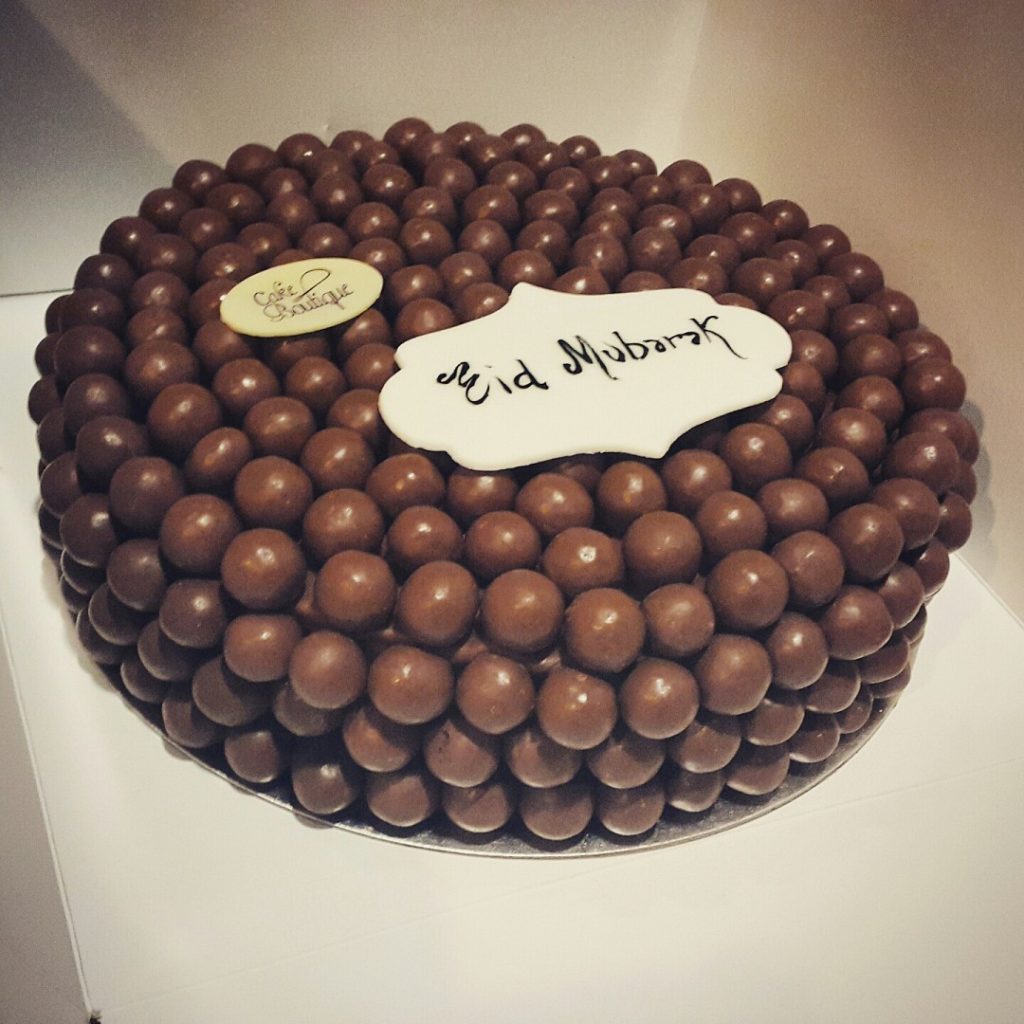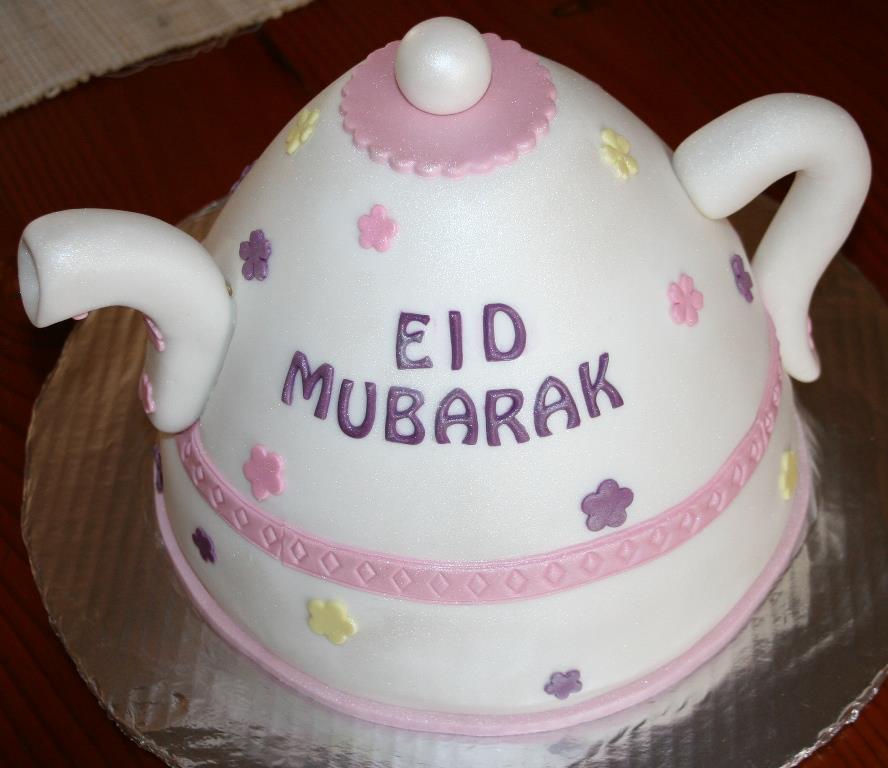بسم الله الرحمن الرحيم
Assalamu Alaikum.
So, tomorrow is the Big Day i.e. the Day of Arafah.
Now, this day has many virtues and there are some acts that should be performed in it, including fasting – all the proofs for which were mentioned in this post.
There is one particular thing that is done on this day that was done by the Prophets (alaihimisalaam).
عَنْ عَمْرِو بْنِ شُعَيْبٍ، عَنْ أَبِيهِ، عَنْ جَدِّهِ، أَنَّ النَّبِيَّ صلى الله عليه وسلم قَالَ : خَيْرُ الدُّعَاءِ دُعَاءُ يَوْمِ عَرَفَةَ وَخَيْرُ مَا قُلْتُ أَنَا وَالنَّبِيُّونَ مِنْ قَبْلِي لاَ إِلَهَ إِلاَّ اللَّهُ وَحْدَهُ لاَ شَرِيكَ لَهُ لَهُ الْمُلْكُ وَلَهُ الْحَمْدُ وَهُوَ عَلَى كُلِّ شَيْءٍ قَدِيرٌ
Amr ibn Shuaib narrated from his father, from his grandfather, that the Prophet (sallallahu alaihi wasallam) said: “The best of supplication is the supplication of the Day of Arafah. And the best of what I and the Prophets before me have said is: None has the right to be worshipped but Allah, Alone, without partner, to Him belongs all that exists, and to Him belongs the Praise, and He is powerful over all things. (Lā ilāha illallāh, waḥdahu lā sharīka lahu, lahul-mulku wa lahul-ḥamdu, wa huwa `alā kulli shai’in qadīr).’” [Jaami At-Tirmidhi, Hadeeth No. 3585. Graded “hasan” (good) by Al-Albani.]
So, this Day is a great time to do dua (supplication) and the best dua is what was mentioned in the above hadeeth.
Here’s a nice poster with this hadeeth (with the word evening instead of day) and the dua:

This article mentions the points of benefits derived from this narration and also provides an audio of this dua.
Now, saying this dua is really easy. The problem is that very often, we lack the FEELING when saying any dua. You know what I mean. We repeat it with our mouths whilst our minds (and hearts) are a zillion miles away.
So, Arafah comes and we just repeat this dua – and we end up not feeling much enjoyment on this big day.
So, how can we get the feeling? Well, one way is by knowing what we’re going to get from saying this supplication.
So, what do we get?
Well, the hadeeth mentioned above tells us one thing that we get from this supplication: following the way of the Prophets (alaihissalaam).
Apart from that, there are virtues of this statement in general that are mentioned in other narrations.
For example, we get Allah’s affirmation that we’ve spoken the truth.
عَنِ الأَغَرِّ أَبِي مُسْلِمٍ، أَنَّهُ شَهِدَ عَلَى أَبِي هُرَيْرَةَ وَأَبِي سَعِيدٍ أَنَّهُمَا شَهِدَا عَلَى رَسُولِ اللَّهِ ـ صلى الله عليه وسلم ـ قَالَ : إِذَا قَالَ الْعَبْدُ لاَ إِلَهَ إِلاَّ اللَّهُ وَاللَّهُ أَكْبَرُ . قَالَ يَقُولُ اللَّهُ عَزَّ وَجَلَّ صَدَقَ عَبْدِي لاَ إِلَهَ إِلاَّ أَنَا وَأَنَا أَكْبَرُ . وَإِذَا قَالَ الْعَبْدُ لاَ إِلَهَ إِلاَّ اللَّهُ وَحْدَهُ . قَالَ صَدَقَ عَبْدِي لاَ إِلَهَ إِلاَّ أَنَا وَحْدِي . وَإِذَا قَالَ لاَ إِلَهَ إِلاَّ اللَّهُ لاَ شَرِيكَ لَهُ . قَالَ صَدَقَ عَبْدِي لاَ إِلَهَ إِلاَّ أَنَا وَلاَ شَرِيكَ لِي . وَإِذَا قَالَ لاَ إِلَهَ إِلاَّ اللَّهُ لَهُ الْمُلْكُ وَلَهُ الْحَمْدُ . قَالَ صَدَقَ عَبْدِي لاَ إِلَهَ إِلاَّ أَنَا لِيَ الْمُلْكُ وَلِيَ الْحَمْدُ . وَإِذَا قَالَ لاَ إِلَهَ إِلاَّ اللَّهُ وَلاَ حَوْلَ وَلاَ قُوَّةَ إِلاَّ بِاللَّهِ . قَالَ صَدَقَ عَبْدِي لاَ إِلَهَ إِلاَّ أَنَا وَلاَ حَوْلَ وَلاَ قُوَّةَ إِلاَّ بِي . قَالَ أَبُو إِسْحَاقَ ثُمَّ قَالَ الأَغَرُّ شَيْئًا لَمْ أَفْهَمْهُ . قَالَ فَقُلْتُ لأَبِي جَعْفَرٍ مَا قَالَ فَقَالَ مَنْ رُزِقَهُنَّ عِنْدَ مَوْتِهِ لَمْ تَمَسَّهُ النَّارُ .
Al-Agharr Abu Muslim bore witness that Abu Hurairah (radiallahu anhu) and Abu Saeed (radiallahu anhu) bore witness that the Messenger of Allah (sallallahu alaihi wasallam) said: “If a person says: ‘La ilaha illallahu wa Allahu Akbar (None has the right to be worshipped but Allah and Allah is the Most Great),’Allah says: ‘My slave has spoken the truth; there is none worthy of worship except I, and I am the Most Great.’ If a person says: La ilaha Illallah wahdahu (There is none worthy of worship except Allah alone), Allah says: ‘My slave has spoken the truth; there is none worthy of worship except I, alone.’ If he says, La ilaha illallahu la sharikalahu (There is none worthy of worship except Allah with no partner or associate),’ Allah says: ‘My slave has spoken the truth; there is none worthy of worship except I, with no partner or associate.’ If he says: ‘La illah illallah, lahul mulku wa lahul hamdu (There is none worthy of worship except Allah, all dominion is His and all praise is to Him),’ Allah says: ‘My slave has spoken the truth; there is none of worthy of worship except I, all dominion is Mine and all praise is due to Me.’ If he says: ‘ La illaha illallah, la hawla wa la quwwata illa billah (There is none worthy of worship and there is no power and no strength except with Allah),’ Allah says: ‘My slave has spoken then truth; there is none worthy of worship except I, and there is no power and no strength except with Me.’ One of the narrators Abu Ishaq said: “Then Al-Agharr (another narrator) said something that I did not understand. I said to Abu Jafar: ‘What did he say?’ He said: ‘Whoever is blessed with (the ability to say) them (these words) at the time of death, the Fire will not touch him.'” [Sunan Ibn Majah, Hadeeth No. 3794. Graded “sahih” (authentic) by Al-Albani.]
Now, this hadeeth doesn’t mention the full dua but it does mention most of it. And it makes it clear that Allah testifies to the truth of the person when he utters any of these statements, subhan Allah.
If someone remembers this hadeeth whilst narrating the dua, wouldn’t there be a different feeling? Obviously.
Apart from that, this dua is repeated at certain times of the day (any day, not just the Day of Arafah) and there are great virtues for that. Unfortunately, many people don’t have the habit of saying it at those times, but perhaps the Day of Arafah might be a good time to start for the following reasons:
1. So that the person can have both rewards, in shaa Allah (i.e. repeating the dua on the Day of Arafah as well saying it at those specific times).
2. It’s easier to remember. If you have to repeat the same dua at certain times in the day, knowing that on this particular day (Day of Arafah) increasing in this dua is what is ordained, then that is easier than memorising multiple duas.
3. So that the person can do more ibaadah (worship) on the Day of Arafah.
4. So that the person can at least do some of these sunnahs once. Every Muslim should at least intend to do all the sunnahs of the Messenger (sallallahu alaihi wasallam) at least once in their lifetime.
5. To make it a starting point for future success. In order to be continuous with an act of worship, one has to actually start it first. And this is where the problem lies. Most people have difficulty getting started. Starting on a big day is easier than starting on a normal day so hopefully someone who starts some of these sunnahs on the Day of Arafah will then feel motivated to continue them beyond that.
So, at what times in the day is this supplication recited?
Well, it can be recited once in the morning and once in the evening.
(Morning means after Fajr prayer, preferably before sunrise, whereas evening means after Asr prayer, preferably before sunset).
عَنْ أَبِي عَيَّاشٍ الزُّرَقِيِّ، قَالَ قَالَ رَسُولُ اللَّهِ ـ صلى الله عليه وسلم ـ : مَنْ قَالَ حِينَ يُصْبِحُ لاَ إِلَهَ إِلاَّ اللَّهُ وَحْدَهُ لاَ شَرِيكَ لَهُ لَهُ الْمُلْكُ وَلَهُ الْحَمْدُ وَهُوَ عَلَى كُلِّ شَىْءٍ قَدِيرٌ – كَانَ لَهُ عَدْلَ رَقَبَةٍ مِنْ وَلَدِ إِسْمَاعِيلَ وَحُطَّ عَنْهُ عَشْرُ خَطِيئَاتٍ وَرُفِعَ لَهُ عَشْرُ دَرَجَاتٍ وَكَانَ فِي حِرْزٍ مِنَ الشَّيْطَانِ حَتَّى يُمْسِيَ وَإِذَا أَمْسَى فَمِثْلُ ذَلِكَ حَتَّى يُصْبِحَ . قَالَ فَرَأَى رَجُلٌ رَسُولَ اللَّهِ ـ صلى الله عليه وسلم ـ فِيمَا يَرَى النَّائِمُ فَقَالَ يَا رَسُولَ اللَّهِ إِنَّ أَبَا عَيَّاشٍ يَرْوِي عَنْكَ كَذَا وَكَذَا . فَقَالَ : صَدَقَ أَبُو عَيَّاشٍ .
It was narrated from Abu Ayyash Az-Zuraqi (radiallahu anhu) that the Messenger of Allah (sallallahu alaihi wasallam) said: “Whoever says in the morning: ‘La illaha illalahu wahdahu la sharika lahu, lahul-mulku wa lahul-hamdu, wa Huwa ‘ala kulli shay’in Qadir (None has the right to be worshipped but Allah alone, with no partner or associate. His is the dominion and all praise is to Him, and He is Able to all things)’ – he will have (a reward) equal to freeing a slave among the sons of Ismail, ten bad deeds will be erased from (his record), he will be raised (in status) ten degrees, and he will have protection against Satan until evening comes. When evening comes, (if he says likewise) he will have the same until morning comes.'” He (one of the narrators) said: “A man saw the Messenger of Allah (sallallahu alaihi wasallam) in a dream and said: ‘O Messenger of Allah, Abu Ayyash narrated such and such from you.’ He said: ‘Abu Ayyash spoke the truth.'” [Sunan Ibn Majah, Hadeeth No. 3867. Graded “sahih” (authentic) by Al-Albani.]
It can also also be repeated once after every obligatory prayer.
عَنْ وَرَّادٍ كَاتِبِ الْمُغِيرَةِ بْنِ شُعْبَةَ أَنَّ مُعَاوِيَةَ كَتَبَ إِلَى الْمُغِيرَةِ أَنِ اكْتُبْ إِلَىَّ بِحَدِيثٍ سَمِعْتَهُ مِنْ رَسُولِ اللَّهِ صلى الله عليه وسلم قَالَ فَكَتَبَ إِلَيْهِ الْمُغِيرَةُ أَنِّي سَمِعْتُهُ يَقُولُ عِنْدَ انْصِرَافِهِ مِنَ الصَّلاَةِ : لاَ إِلَهَ إِلاَّ اللَّهُ، وَحْدَهُ لاَ شَرِيكَ لَهُ، لَهُ الْمُلْكُ، وَلَهُ الْحَمْدُ، وَهْوَ عَلَى كُلِّ شَىْءٍ قَدِيرٌ . ثَلاَثَ مَرَّاتٍ قَالَ وَكَانَ يَنْهَى عَنْ قِيلَ وَقَالَ وَكَثْرَةِ السُّؤَالِ، وَإِضَاعَةِ الْمَالِ، وَمَنْعٍ وَهَاتِ، وَعُقُوقِ الأُمَّهَاتِ، وَوَأْدِ الْبَنَاتِ.
Narrated Warraad: (the clerk of Al-Mughira bin Shubah) Muawiyah (radiallahu anhu) wrote to Al-Mughirah (radiallahu anhu): “Write to me a narration you have heard from Allah’s Messenger (sallallahu alaihi wasallam).” So Al-Mughirah wrote to him, “I heard him saying the following after each prayer: ‘La ilaha illal-lahu wahdahu la sharika lahu, lahu-l-mulk wa lahuI-hamd, wa huwa ‘ala kulli Shai-in qadir.’ He also used to forbid idle talk, asking too many questions (in religion), wasting money, preventing what should be given, and asking others for something (except in great need), being undutiful to mothers, and burying one’s little daughters (alive). [Sahih Al-Bukhari, Volume 8, Hadeeth No. 480]
Please note that starting from the Fajr prayer of the Day of Arafah until (and including) the Asr prayer of the 13th of Dhul Hijjah, the takbeer is also meant to be said after each obligatory prayer. This is in addition to saying the takbeer at any time (in the first 13 days of Dhul Hijjah – until sunset on the 13th day). The method of takbeer was described in this old (but still extremely useful) post of mine.
I’d advise those who really want to say both the dua and the takbeer after each obligatory prayer to just make a note and perhaps keep it somewhere near their prayer kit so that they don’t forget.
Apart from the above, this dua can also be recited ten times.
عَنْ أَبِي إِسْحَاقَ، عَنْ عَمْرِو بْنِ مَيْمُونٍ، قَالَ : مَنْ قَالَ لاَ إِلَهَ إِلاَّ اللَّهُ وَحْدَهُ لاَ شَرِيكَ لَهُ لَهُ الْمُلْكُ وَلَهُ الْحَمْدُ وَهُوَ عَلَى كُلِّ شَىْءٍ قَدِيرٌ عَشْرَ مِرَارٍ كَانَ كَمَنْ أَعْتَقَ أَرْبَعَةَ أَنْفُسٍ مِنْ وَلَدِ إِسْمَاعِيلَ . وَقَالَ سُلَيْمَانُ حَدَّثَنَا أَبُو عَامِرٍ حَدَّثَنَا عُمَرُ حَدَّثَنَا عَبْدُ اللَّهِ بْنُ أَبِي السَّفَرِ عَنِ الشَّعْبِيِّ عَنْ رَبِيعِ بْنِ خُثَيْمٍ . بِمِثْلِ ذَلِكَ قَالَ فَقُلْتُ لِلرَّبِيعِ مِمَّنْ سَمِعْتَهُ قَالَ مِنْ عَمْرِو بْنِ مَيْمُونٍ – قَالَ – فَأَتَيْتُ عَمْرَو بْنَ مَيْمُونٍ فَقُلْتُ مِمَّنْ سَمِعْتَهُ قَالَ مِنِ ابْنِ أَبِي لَيْلَى – قَالَ – فَأَتَيْتُ ابْنَ أَبِي لَيْلَى فَقُلْتُ مِمَّنْ سَمِعْتَهُ قَالَ مِنْ أَبِي أَيُّوبَ الأَنْصَارِيِّ يُحَدِّثُهُ عَنْ رَسُولِ اللَّهِ صلى الله عليه وسلم .
Amr ibn Maimun reported: He who uttered:” There is none worthy of worship except Allah, the One, having no partner with Him, His is the Sovereignty and all praise is due to Him and He is Power over everything” ten times, he is like one who emancipated four slaves from the progeny of Ismail. Rabi ibn Khuthaim narrated a hadith like this. Shabi reported: I said to Rabi: From whom did you hear it? He said: From Amr ibn Maimun. I came to Amr ibn Maimun and said to him: From whom did you hear this hadith? He said: from Ibn Abi Laila. I came to Ibn Abi Laila and said to him: From whom did you hear this hadith? He said: From Abu Ayyub Ansari, who narrated from Allah’s Messenger (sallallahu alaihi wasallam). [Sahih Muslim, Hadeeth No. 6510]
For the one who really wants to upgrade, it can be recited one hundred times in a day.
عَنْ أَبِي هُرَيْرَةَ ـ رضى الله عنه ـ أَنَّ رَسُولَ اللَّهِ صلى الله عليه وسلم قَالَ : مَنْ قَالَ لاَ إِلَهَ إِلاَّ اللَّهُ وَحْدَهُ لاَ شَرِيكَ لَهُ، لَهُ الْمُلْكُ، وَلَهُ الْحَمْدُ، وَهُوَ عَلَى كُلِّ شَىْءٍ قَدِيرٌ. فِي يَوْمٍ مِائَةَ مَرَّةٍ، كَانَتْ لَهُ عَدْلَ عَشْرِ رِقَابٍ، وَكُتِبَتْ لَهُ مِائَةُ حَسَنَةٍ، وَمُحِيَتْ عَنْهُ مِائَةُ سَيِّئَةٍ، وَكَانَتْ لَهُ حِرْزًا مِنَ الشَّيْطَانِ يَوْمَهُ ذَلِكَ حَتَّى يُمْسِيَ، وَلَمْ يَأْتِ أَحَدٌ بِأَفْضَلَ مِمَّا جَاءَ بِهِ، إِلاَّ أَحَدٌ عَمِلَ أَكْثَرَ مِنْ ذَلِكَ
Narrated Abu Hurairah (radiallahu anhu): Allah’s Messenger (sallallahu alaihi wasallam) said, “If one says one-hundred times in one day: “None has the right to be worshipped but Allah, the Alone Who has no partners, to Him belongs Dominion and to Him belong all the Praises, and He has power over all things (i.e. Omnipotent)”, one will get the reward of manumitting ten slaves, and one-hundred good deeds will be written in his account, and one-hundred bad deeds will be wiped off or erased from his account, and on that day he will be protected from the morning till evening from Satan, and nobody will be superior to him except one who has done more than that which he has done.” [Sahih Al-Bukhari, Volume 4, Hadeeth No. 514]
Given that this dua is meant to be repeated on the Day of Arafah, this hadeeth is a good motivation for everyone to at least recite this dua a hundred times on this day! And remember, Arafah ends at sunset so it needs to be before that.
Now, does a person need to recite this 100 times in one stretch? Well, according to Imam An-Nawawi (rahimahullah), a person can recite it in one stretch or at different times, some of it in the morning and some of it after that. However, he states that it is better to say it 100 times in one stretch at the beginning of the morning (i.e. after Fajr prayer) so that a person gets the protection (mentioned in the hadeeth) for the whole day.
So, if you can recite it all at one stretch in the morning, well and good. If it’s difficult though, just try to say a little bit throughout the day until you get to a hundred.
Now apart from all of the above virtues of this dua, one should remember that it is essentially the shahaadah (the testimony of faith) which itself has so many virtues – but only for the one who believes in it and acts according to it.
One of its virtues is that it is the best remembrance.
عن جَابِرَ بْنَ عَبْدِ اللَّهِ، يَقُولُ سَمِعْتُ رَسُولَ اللَّهِ ـ صلى الله عليه وسلم ـ يَقُولُ : أَفْضَلُ الذِّكْرِ لاَ إِلَهَ إِلاَّ اللَّهُ وَأَفْضَلُ الدُّعَاءِ الْحَمْدُ لِلَّهِ
Jaabir ibn Abdullah (radiallahu anhuma) narrated that the Messenger of Allah (sallallahu alaihi wasallam) said: “The best remembrance is ‘Laa ilaaha illallah’ (There is none worthy of worship except Allah) and the best supplication is: ‘Alhamdulillah’ (All praise is due to Allah).” [Sunan At-Tirmidhi, Hadeeth No. 3383. Graded “hasan” (good) by Al-Albani.]
If it’s the last thing you say before you drop dead, you’ve made it.
عَنْ مُعَاذِ بْنِ جَبَلٍ، قَالَ قَالَ رَسُولُ اللَّهِ صلى الله عليه وسلم : مَنْ كَانَ آخِرُ كَلاَمِهِ لاَ إِلَهَ إِلاَّ اللَّهُ دَخَلَ الْجَنَّةَ
It was narrated that Muadh ibn Jabal (radiallahu anhu) said: “The Messenger of Allah (sallallahu alaihi wasallam) said: ‘The one whose last words are ‘Laa ilaaha illallah’ (there is none worthy of worship except Allah) will enter Paradise.’” [Sunan Abee Dawood, Hadeeth No. 3116. Graded “sahih” (authentic) by Al-Albani]
May Allah make us all from amongst those whose last words are laa ilaaha illallah.
The shahaadah is also the best of good deeds.
عن أبي ذر قال: قلت: يا رسول الله، أوصني. قال: إذا عملت سيئة فأتبعها حسنة تمحها. قال: قلت: يا رسول الله أمن الحسنات لا إله إلا الله؟ قال: هي أفضل الحسنات
Abu Dharr (radiallahu anhu) narrated: “I said: ‘O Messenger of Allah! Advise me.’ He (sallallahu alaihi wasallam) said: ‘If you commit a sin then do a righteous deed. It will erase it (i.e. the sin).’ I said: ‘O Messenger of Allah! Is “Laa Ilaaha Illallah” from amongst the good deeds?’ He said: ‘It is the best of good deeds.” [Musnad Ahmad, Hadeeth No. 21487. Classified as ‘hasan lighairihee” (good due to supporting narrations) by Shuaib Al-Arnaut.]
And it really weighs heavily on the scale (that weighs good deeds).
عن عَبْد الله بنَ عَمْرِو بنِ العَاص ، سَمِعْتُ رَسُولَ الله يقول: إِنَّ الله سَيُخَلِّصُ رَجُلاً مِنْ أُمَتِي عَلَى رُؤُوسِ الْخَلاَئِقِ يَوْمَ القِيَامَةِ فَيَنْشُرُ عَلَيْهِ تِسْعَةً وَتِسْعِينَ سِجِلاًّ، كُلُّ سِجِلٍ مِثْلُ مَدّ البَصَرِ ثُمَّ يَقُولُ: أَتُنْكِرُ مِنْ هَذَا شَيْئَاً؟ أَظَلَمَكَ كَتَبَتِي الْحافِظُونَ؟ فيَقُولُ لاَ يَا رَبِّ، فَيَقُولُ: أَفَلَكَ عُذْرٌ؟ فَيَقُولُ لاَ يَا رَبِّ، فَيَقُولُ: بَلَى إِنَّ لَكَ عِنْدَنَا حَسَنَةً فَإِنَّهُ لاَ ظُلْمَ عَلَيْكَ الْيَوْمَ، فَتُخْرَجُ بِطَاقَةٌ فِيهَا أَشْهَدُ أَنْ لاَ إِلَهَ إِلاَّ الله وَأَشْهَدُ أَنَّ مُحَمَّداً عَبْدُهُ وَرَسُولُهُ، فَيَقُولُ: احْضُرْ وَزْنَكَ، فَيَقُولُ يَا ربِّ مَا هَذِهِ البِطَاقَةُ مَع هَذِهِ السِّجِلاَّتُ؟ فَقَالَ فَإِنَّكَ لاَ تُظْلَمُ. قالَ: فَتُوْضَعُ السِّجِلاَّتُ فِي كِفَّةٍ وَالِبطَاقَةُ في كِفَّةٍ فَطَاشَتْ السِّجِلاَّتُ وَثَقُلَت البِطَاقَةُ، ولا يَثْقُلُ مَعَ اسْمِ الله شَيْءٌ
Abdullah ibn Amr ibn Al-Aas (radiallahu anhuma) narrated that the Messenger of Allah (sallallahu alaihi wasallam) said: “Indeed Allah will distinguish a man from my Ummah before all of creation on the Day of Judgement. Ninety-nine scrolls will be laid out for him, each scroll is as far as the eye can see, then He will say: ‘Do you deny any of this? Have those who recorded this wronged you?’ He will say: ‘No, O Lord!’ So He will say: ‘Do you have an excuse?’ He will say: ‘No, O Lord!’ So He will say: ‘Rather you have a good deed with Us, so you shall not be wronged today.” Then He will bring out a card (Bitaaqah); on it will be: ‘Ash-hadu an laa ilaaha illallah wa ash-hadu anna Muhammadan abduhu wa rasooluh’ (I testify that there is none worthy of worship except Allah and I testify that Muhmmad is the His slave and His Messenger). He will say: ‘Bring your scales.’ He will say: ‘O Lord! What good is this card next to these scrolls?’ He will say: ‘You shall not be wronged.’ He said: ‘The scrolls will be put on a pan (of the scale) and the card on (the other) pan; the scrolls will be light, and the card will be heavy, nothing is heavier than the name of Allah.’” [Jaami At-Tirmidhi, Hadeeth No. 2639. Graded “sahih” (authentic) by Al-Albani.]
It is also what gets the true (but sinful) believers out of Hell.
عَنْ أَنَس بْن مَالِكٍ، أَنَّ النَّبِيَّ صلى الله عليه وسلم قَالَ : يَخْرُجُ مِنَ النَّارِ مَنْ قَالَ لاَ إِلَهَ إِلاَّ اللَّهُ وَكَانَ فِي قَلْبِهِ مِنَ الْخَيْرِ مَا يَزِنُ شَعِيرَةً ثُمَّ يَخْرُجُ مِنَ النَّارِ مَنْ قَالَ لاَ إِلَهَ إِلاَّ اللَّهُ وَكَانَ فِي قَلْبِهِ مِنَ الْخَيْرِ مَا يَزِنُ بُرَّةً ثُمَّ يَخْرُجُ مِنَ النَّارِ مَنْ قَالَ لاَ إِلَهَ إِلاَّ اللَّهُ وَكَانَ فِي قَلْبِهِ مِنَ الْخَيْرِ مَا يَزِنُ ذَرَّةً
Anas ibn Malik (radiallahu anhu) reported: Verily the Messenger of Allah (sallallahu alaihi wasallam) said: He who professed: There is none worthy of worship but Allah, would be brought out of the Fire even though he has in his heart virtue equal to the weight of a barley grain. Then he who professed: There is none worthy of worship but Allah, would come out of the Fire, even though he has in his heart virtue equal to the weight of a wheat grain. He would then bring out from the Fire he who professed: There is none worthy of worship but Allah, even though he has in his heart virtue equal to the weight of an atom. [Sahih Muslim, Hadeeth No. 376]
So, please remember the virtues of the shahaadah when you recite the dua of Arafah.
However, I should point out that it’s not enough to just know the virtues of the shahaadah. Knowing the meaning is also very important. I’ve put up some resources for that in the first part of the Best of Journeys series.
If you keep all these virtues in mind whilst reciting the dua of Arafah, in shaa Allah, you’ll really enjoy this day.
After the Day of Arafah, of course, is the Day of Eid Al-Adha (also known as the Day of Sacrifice). It also happens to be the best day of the year.
عَنْ عَبْدِ اللَّهِ بْنِ قُرْطٍ، عَنِ النَّبِيِّ صلى الله عليه وسلم قَالَ : إِنَّ أَعْظَمَ الأَيَّامِ عِنْدَ اللَّهِ تَبَارَكَ وَتَعَالَى يَوْمُ النَّحْرِ ثُمَّ يَوْمُ الْقَرِّ . قَالَ عِيسَى قَالَ ثَوْرٌ وَهُوَ الْيَوْمُ الثَّانِي . قَالَ وَقُرِّبَ لِرَسُولِ اللَّهِ صلى الله عليه وسلم بَدَنَاتٌ خَمْسٌ أَوْ سِتٌّ فَطَفِقْنَ يَزْدَلِفْنَ إِلَيْهِ بِأَيَّتِهِنَّ يَبْدَأُ فَلَمَّا وَجَبَتْ جُنُوبُهَا – قَالَ فَتَكَلَّمَ بِكَلِمَةٍ خَفِيَّةٍ لَمْ أَفْهَمْهَا فَقُلْتُ مَا قَالَ – قَالَ : مَنْ شَاءَ اقْتَطَعَ
Narrated Abdullah ibn Qurt (radiallahu anhu): The Prophet (sallallahu alaihi wasallam) said: “The greatest day in Allah’s sight is the day of sacrifice and next the day of resting”, which Isa said on the authority of Thawr is the second day. Five or six sacrificial camels were brought to the Messenger of Allah (sallallahu alaihi wasallam) and they began to draw near to see which he would sacrifice first. When they fell down dead, he said something in a low voice, which I could not catch. So I asked: What did he say? He was told that he had said: Anyone who wants can cut off a piece. [Sunan Abee Dawood, Hadeeth No. 1765. Graded “sahih” (authentic) by Al-Albani.]
It is also a day of eating and drinking.
عن عُقْبَة بْنَ عَامِرٍ، قَالَ قَالَ رَسُولُ اللَّهِ صلى الله عليه وسلم : يَوْمُ عَرَفَةَ وَيَوْمُ النَّحْرِ وَأَيَّامُ التَّشْرِيقِ عِيدُنَا أَهْلَ الإِسْلاَمِ وَهِيَ أَيَّامُ أَكْلٍ وَشُرْبٍ
Narrated Uqbah ibn Amir (radiallahu anhu): The Prophet (sallallahu alaihi wasallam) said: The Day of Arafah, the Day of Sacrifice, the Days of Tashreeq are (the days of) our Eid, the people of Islam and they are the days of eating and drinking. [Sunan Abee Dawood, Hadeeth No. 2419. Graded “sahih” (authentic) by Al-Albani.]
On the bright side, at least the “eating and drinking” part is something we all excel in:




(And yes, all of them are cakes.)
I hope that all of you have a great Day of Arafah and a great Eid as well. May Allah accept our deeds in these blessed days.
